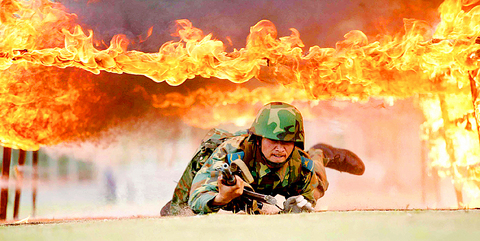A highly classified report said US intelligence agencies had failed to recognize more than a dozen key military developments in China in the past decade, the Washington Times said yesterday.
The report, drawn up by current and former intelligence officials, blames Chinese secrecy for part of the failures, but also US intelligence agents for not gathering solid information on the Chinese military and for not planting agents in the communist government, officials familiar with the report told the daily.
The study, parts of which will be included in the Pentagon's annual report to Congress on the Chinese military to be released later this month, highlighted failures to notice the following aspects of China's military buildup:

PHOTO: AP
* The development of a new long-range cruise missile, and of a new warship equipped with a stolen Chinese version of the US AEGIS battle management technology.
* The deployment of a new attack submarine known as the Yuan class; of precision-guided munitions, including new air-to-ground missiles and new, more accurate warheads; and of surface-to-surface missiles.
* The importation of advanced weaponry, including Russian submarines, warships and fighter-bombers.
The secret report, produced for the new director of national intellingence, John Negroponte, appears to unfairly target intelligence operators, its critics said, and to exonerate intelligence analysts, who for the past 10 years dismissed or played down intelligence on China's military buildup.
US Defense Secretary Donald Rumsfeld, during an annual international security conference in Singapore on Saturday, said China appeared to be expanding its missile forces, "allowing them to reach targets in many areas of the world."
"China also is improving its ability to project power, and is developing advanced systems of military technology," he said.
"Since no nation threatens China, one wonders: why this growing investment? Why these continuing large weapons purchases?"
He said the soon-to-be-released Pentagon study concludes that China's defense budget is now the largest in Asia and the third-largest in the world.
China's foreign ministry spokesman, Liu Jianchao (劉建超), on Tuesday rejected Rumsfeld's claims as "totally groundless," saying that the small increases in defense spending in recent years was dedicated mostly to "the improvement of the living conditions of the officers and soldiers."
"China has not the intention nor the capability to drastically increase its military buildup," Liu said.

CHAOS: Iranians took to the streets playing celebratory music after reports of Khamenei’s death on Saturday, while mourners also gathered in Tehran yesterday Iranian Supreme Leader Ayatollah Ali Khamenei was killed in a major attack on Iran launched by Israel and the US, throwing the future of the Islamic republic into doubt and raising the risk of regional instability. Iranian state television and the state-run IRNA news agency announced the 86-year-old’s death early yesterday. US President Donald Trump said it gave Iranians their “greatest chance” to “take back” their country. The announcements came after a joint US and Israeli aerial bombardment that targeted Iranian military and governmental sites. Trump said the “heavy and pinpoint bombing” would continue through the week or as long

TRUST: The KMT said it respected the US’ timing and considerations, and hoped it would continue to honor its commitments to helping Taiwan bolster its defenses and deterrence US President Donald Trump is delaying a multibillion-dollar arms sale to Taiwan to ensure his visit to Beijing is successful, a New York Times report said. The weapons sales package has stalled in the US Department of State, the report said, citing US officials it did not identify. The White House has told agencies not to push forward ahead of Trump’s meeting with Chinese President Xi Jinping (習近平), it said. The two last month held a phone call to discuss trade and geopolitical flashpoints ahead of the summit. Xi raised the Taiwan issue and urged the US to handle arms sales to

State-run CPC Corp, Taiwan (CPC, 台灣中油) yesterday said that it had confirmed on Saturday night with its liquefied natural gas (LNG) and crude oil suppliers that shipments are proceeding as scheduled and that domestic supplies remain unaffected. The CPC yesterday announced the gasoline and diesel prices will rise by NT$0.2 and NT$0.4 per liter, respectively, starting Monday, citing Middle East tensions and blizzards in the eastern United States. CPC also iterated it has been reducing the proportion of crude oil imports from the Middle East and diversifying its supply sources in the past few years in response to geopolitical risks, expanding

Pro-democracy media tycoon Jimmy Lai’s (黎智英) fraud conviction and prison sentence were yesterday overturned by a Hong Kong court, in a surprise legal decision that comes soon after Lai was jailed for 20 years on a separate national security charge. Judges Jeremy Poon (潘兆初), Anthea Pang (彭寶琴) and Derek Pang (彭偉昌) said in the judgement that they allowed the appeal from Lai, and another defendant in the case, to proceed, as a lower court judge had “erred.” “The Court of Appeal gave them leave to appeal against their conviction, allowed their appeals, quashed the convictions and set aside the sentences,” the judges